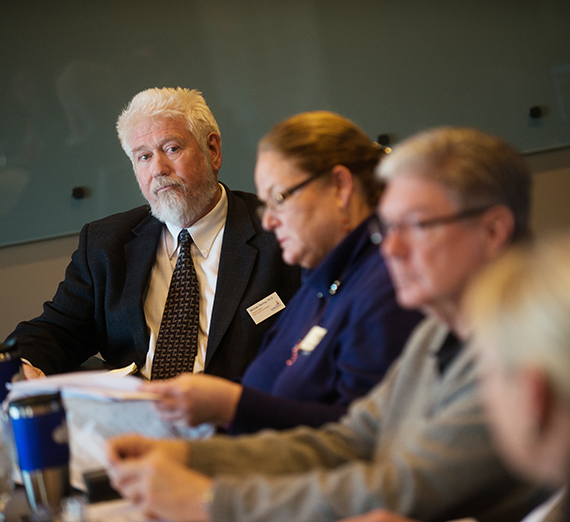Gonzaga Embraces Opus Opportunities

(Above) Opus judges on campus in January 2014
Gonzaga News Service
SPOKANE, Wash. — This fall, Gonzaga University will host the 2014 Opus Prize, one of the world's most important faith-based humanitarian honors with a top award of $1 million, and faculty, staff and students are embracing the transformative opportunities it offers to learn directly from some of our world's top entrepreneurial humanitarians.
Gonzaga's selection to administer the Opus Prize and present a public award ceremony in October provides a unique living laboratory for Gonzaga faculty, staff and students to study some of the world's most innovative humanitarian leaders making a difference. Among the most sought-after opportunities, Gonzaga this month selected seven students, three faculty members and one staff representative who will travel in teams to finalists' work sites to assess their efforts. The teams were chosen from more than 70 students and 35 faculty and staff who applied.
Many other Gonzaga community members are engaged in the project, helping to design and organize learning opportunities as well as the campus welcome and engagement with the finalists.
Three finalists and one alternate for the award were chosen (from 26 nominations) in January by a panel of 15 distinguished jurors — selected by Gonzaga — who met on campus. The Opus Prize Foundation will select the primary award winner by late summer based, in part, on the judgment of the Gonzaga teams that will have evaluated the finalists' work. The two runner-ups will receive $100,000 each. The names and countries of the award finalists will remain confidential until October.
Gonzaga Evaluation Teams Chosen
In March, Lazarina Topuzova, assistant professor of organizational leadership, will accompany and support students Meaghan Driscoll, Carson Schneider and Hayley Medeiros to the workplace of a finalist in North America who works to support and integrate incarcerated women into society. In May, business-marketing Professor Peggy Sue Loroz and Luisa Gallagher, service immersion coordinator for Gonzaga's Center for Community Action and Service-Learning, will travel with students Jalene Herron and Aaron Danowski to the site of a finalist who creates educational opportunities and supports health care for children and their families in Asia. Greg Gordon, assistant professor of environmental studies, also departs in May with students Francis Chau and Allison Chra to Southeast Asia to evaluate the work of a finalist who supports human rights and sustainable educational and environmental improvements.
The trips will be led by Don Neureuther, executive director of the Opus Prize Foundation, and will include members of the Opus Prize Board of Directors.
"We want to find the next Mother Teresa, the social entrepreneur, an unsung hero, who is transforming lives of poor," said Neureuther, who came to campus Feb. 10 to train the groups.
The private, independent and nonprofit Opus Prize Foundation was established in 1994 by a Midwest Catholic family that wishes to remain in the background as it provides "a cannon shot" gift that meaningfully honors and supports individuals and organizations making substantial changes in transforming the lives of the poor, Neureuther said.
Early on, Father Steve Privett, S.J., outgoing president of University of San Francisco and a 1966 Gonzaga alumnus, encouraged the family to use Catholic universities in the process.
"The family said, 'that make a lot of sense,' and it's one of the best decisions that the board of directors ever made. We have since then partnered with a different Catholic university every year, from different parts of the country, different sizes — some are large, some are small, Jesuit and non-Jesuit," Neureuther said.
Unsung Heroes Will Engage Community
Opportunities for the Gonzaga and Spokane communities to engage with and learn from the Opus Prize finalists run from Oct.14-16 and include classroom discussions and presentations — culminating in a public awards ceremony at Martin Woldson Theatre at The Fox. This is the first time Gonzaga has been chosen to administer the prize - an honor that aligns ideally with Gonzaga's mission to educate women and men for others.
"We anticipate that the stories of the finalists and the profound good they are doing in the world will inspire our own campus community and residents throughout the Inland Northwest toward greater awareness and support of social justice work worldwide," said Michael Herzog, Gonzaga President Thayne McCulloh's chief of staff, and project leader.
